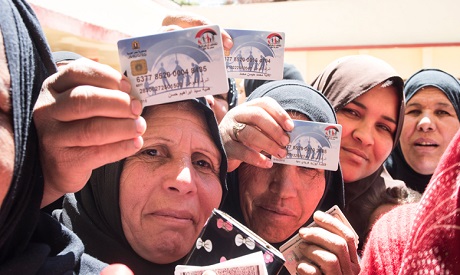
Egyptian women holding their cards of The Egyptian government cash transfer program, calling "Takaful and Karama", which mean Dignity and Solidarity in Arabic (Photo: courtesy of The World Bank Official Website)
In a bid to mitigate the negative impacts of its economic reform programme on some of the poorest segments of Egypt’s population, the government has been investing in building and strengthening the social safety net that targets the poorest households and the most marginalised people across the country.
The floatation of the Egyptian pound in November 2016, along with cutting energy subsidies, raised prices across the board and sent inflation rates to a record high of 33 per cent in July 2017.
President Abdel-Fattah Al-Sisi has directed the government to strengthen social protection for the poor and the most vulnerable groups. Last week, he directed the government to find ways to provide further social insurance for daily labourers.
The government upped spending on social security measures in the 2017/18 budget. Allocations for social protection in the 2017/18 budget were put at LE72 billion.
The package includes raising subsidies on ration cards from LE21 to LE50 per person, an increase of 140 per cent.
Finance Minister Amr Al-Garhi said last month that the allocation for commodities in the budget had increased by 65 per cent year-on-year to LE23.3 billion in the first half of the current fiscal year.
This comes as the cash subsidies allocation for subsidy cardholders increased by 140 per cent year-on-year to LE9.9 billion.
President Al-Sisi’s decision to increase pensions by 15 per cent to benefit nearly 10 million pensioners and their families hiked the pensions budget to LE190 billion, compared to LE41 billion in the 2009-2010 fiscal year budget, according to Planning Minister Hala Al-Said.
One main feature of the social protection system are the cash transfer programmes Takaful and Karama that benefit some two million families in 5,630 villages spanning all the governorates.
In June 2017, Al-Sisi approved a LE100 increase in the monthly allowances for beneficiaries of the Takaful and Karama programmes. A report by the Finance Ministry this month showed that spending on the programmes was up to a combined 141 per cent year-on-year.
Both programmes were launched in 2015. Takaful is an income-support programme for families with children up to 18 years that is designed to produce human development outcomes.
It includes commitments to families regarding child health and nutrition (up to six years), school enrolment and 80 per cent attendance for children (up to 18 years) and maternal care for pregnant and lactating mothers.
Karama is a social-inclusion programme for people who cannot work, specifically the elderly and persons with disabilities, and it is designed to provide social protection and a decent life for these segments.
Both programmes where hailed by economists as they diverge from conventional pension schemes and aim to deliver subsidies to those who need them most and limit waste and corruption in social spending.
Researcher Mohamed Gad said the programmes had been very effective and had expanded rapidly, reaching some two million beneficiaries in three years. The conventional social insurance scheme, launched in the 1950s, benefits some 1.7 million, he said.
He said the programmes were developed in their methodology as they were more targeted and ensured a fairer provision of social protection outcomes.
However, he also said that they should be seen as part of a larger social safety network, rather than being “publicity” for the government in the light of the economic measures taken.
The government’s social-protection package also includes raising the limit of income-tax exemptions from LE6,500 per year to LE7,200, which will cost the state about LE7 billion.
The government decided to halt the tax on agricultural land for three years in order to ease the tax burden on the agricultural sector.
* This story was first published in Al-Ahram Weekly
Short link: